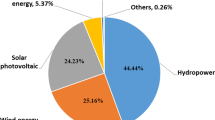Abstract
In this paper, we extend the work of Goes, Tuana, and Keller (Climatic Change 2011; GTK) by reexamining the economic benefit, of aerosol geoengineering. GTK found that a complete substitution of geoengineering for CO2 abatement fails a cost-benefit test over a wide range of scenarios regarding (i) the probability that such a program would be aborted and (ii) the economic damages caused by geoengineering itself. In this paper, we reframe the conditions under which GTK assumed geoengineering would/could be used. In so doing, we demonstrate that geoengineering may pass a cost-benefit test over a wide range of scenarios originally considered by GTK.








Similar content being viewed by others
Notes
GTK used the discounting framework detailed in Newell and Pizer (2004). As Gollier and Weitzman (2010) have recently shown, this framework assumes there is an immediate and permanent dislocation in the return to capital. Gollier (2009) proved that if uncertainty in returns is transitory, for example, if it follows Geometric Brownian Motion, as assumed by Newell and Pizer (2004), then the term-structure of interest rates should be flat.
References
Bickel JE, Lane L (2010) Climate engineering. In: Lomborg B (ed) Smart solutions to climate change: Comparing costs and benefits. Cambridge University Press, Cambridge, pp 9–51
Goes M, Tuana N, Keller K (2011) The economics (or lack thereof) of aerosol geoengineering, Climatic Change
Gollier C (2009) Should we discount the far-distant future at its lowest possible rate?, Economics: The Open-Access, Open-Assessment E-Journal 3(2009-25) doi:10.5018/economics-ejournal.ja.2009-5025, http://dx.doi.org/5010.5018/economics-ejournal.ja.2009-5025
Gollier C, Weitzman ML (2010) How should the distant future be discounted when discount rates are uncertain? Econ Lett 107:350–353
Kriegler E (2005) Imprecise probability analysis for integrated assessment of climate change. University of Potsdam, Potsdam
Lempert RJ, Schlesinger ME, Bankes SC et al (2000) The impacts of climate variability on near-term policy choices and the value of information. Clim Chang 45:129–161
Lenton TM, Held H, Kriegler E et al (2008) Tipping elements in the earth's climate system. PNAS 105(6):1786–1793
Matthews HD, Caldeira K (2007) Transient climate-carbon simulations of planetary geoengineering. PNAS 104(24):9949–9954
McInerney D, Keller K (2008) Economically optimal risk reduction strategies in the face of uncertain climate thresholds. Clim Chang 91:5–10
Newell RG, Pizer WA (2004) Uncertain discounte rates in climate policy analysis. Energy Policy 32:519–529
Nordhaus WD (2008) A question of balance. Yale University Press, New Haven
Weitzman ML (1998) Why the far-distant future should be discounted at its lowest possible rate. J Environ Econ Manag 36:201–208
Wigley TML (2006) A combined mitigation/geoengineering approach to climate stabilization. Science 314:452–454
Acknowledgements
The authors thank the Center for International Energy and Environmental Policy at the University of Texas for partially supporting this work. The authors also thank the Assistant Deputy Editor and three anonymous referees for their comments and suggestions regarding an earlier draft of this paper.
Author information
Authors and Affiliations
Corresponding author
Electronic supplementary material
Below is the link to the electronic supplementary material.
ESM 1
(PDF 57 kb)
Rights and permissions
About this article
Cite this article
Bickel, J.E., Agrawal, S. Reexamining the economics of aerosol geoengineering. Climatic Change 119, 993–1006 (2013). https://doi.org/10.1007/s10584-012-0619-x
Received:
Accepted:
Published:
Issue Date:
DOI: https://doi.org/10.1007/s10584-012-0619-x




